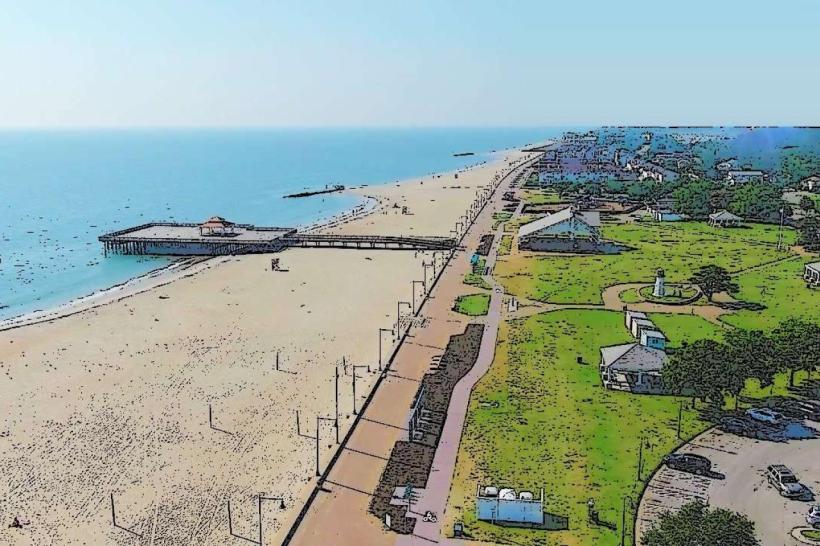Information
Landmark: Sandy Bottom Nature ParkCity: Hampton
Country: USA Virginia
Continent: North America
Sandy Bottom Nature Park, Hampton, USA Virginia, North America
Location and Setting
Sandy Bottom Nature Park is situated at 1255 Big Bethel Road in Hampton, Virginia, spanning an impressive 456 acres of natural landscapes, wetlands, lakes, forests, and open fields. Nestled in a suburban area yet offering a true immersion in nature, the park acts as a vital green space preserving local ecosystems and providing a serene refuge for both wildlife and people.
The park’s location makes it easily accessible to residents and visitors of Hampton and the surrounding Hampton Roads metropolitan region, offering a blend of environmental education, outdoor recreation, and nature conservation.
Historical Background and Environmental Transformation
Originally, much of the land that is now Sandy Bottom Nature Park was used as borrow pits for construction and later served as a garbage dump. Over decades, the city of Hampton undertook a significant environmental restoration and transformation project to rehabilitate the site. Through careful planning, reforestation, habitat creation, and water quality improvement, the area was reborn as a vibrant natural park.
The park exemplifies successful urban environmental restoration, turning a previously degraded site into a thriving ecosystem supporting diverse flora and fauna, and creating a vital community asset for recreation and education.
Natural Environment and Ecology
The park’s diverse habitats include freshwater lakes, wetlands, forested areas, meadows, and marshes, supporting a rich variety of wildlife species. Visitors can observe birds, amphibians, mammals, and native plants in a natural setting.
Lakes: Sandy Bottom Lake and Crystal Lake are central features, providing aquatic habitats and opportunities for fishing, boating, and wildlife observation.
Wetlands: Vital for water filtration and habitat, wetlands within the park support amphibians, reptiles, and migratory birds.
Forests and Meadows: These areas host native trees, wildflowers, and serve as corridors for wildlife movement.
The park’s ecological management focuses on sustaining native biodiversity, controlling invasive species, and promoting healthy ecosystems.
Facilities and Amenities
Sandy Bottom Nature Park offers extensive facilities designed to accommodate a wide range of activities and visitors:
1. Nature Center
A spacious, modern 10,000-square-foot Nature Center serves as the educational hub.
The center houses exhibits about local ecosystems, wildlife, geology, and environmental science.
Interactive displays and live animal exhibits help visitors understand natural processes and conservation efforts.
It operates seasonally, generally open from 9 a.m. to 4:30 p.m. during cooler months (October through April) and extended hours until 6 p.m. in warmer months (May through September).
The center hosts educational programs, workshops, and community events.
2. Trails
The park features over 12 miles of multi-use trails designed for hiking, biking, and horseback riding.
Trails vary in length and difficulty, catering to casual walkers and more serious outdoor enthusiasts.
Notable trails include:
Trillium Trail (3.3 miles): A scenic route winding through varied habitats.
Osprey Point Trail: Offering picturesque views over the lakes and opportunities for birdwatching.
Trails are well-maintained and clearly marked with interpretive signs explaining ecological and historical points of interest.
3. Fishing and Boating
Both Sandy Bottom Lake and Crystal Lake support recreational fishing, popular for species like Largemouth Bass, Bluegill, Crappie, and Catfish.
A fishing pier allows shoreline anglers easy access.
The park rents 14-foot Jon boats, enabling visitors to fish or explore the lakes by water.
Anglers aged 16 and older must have a valid Virginia freshwater fishing license.
The lakes also provide habitat for aquatic wildlife, enhancing the park’s biodiversity.
4. Camping
Sandy Bottom offers nine individual campsites and two group campsites available on a first-come, first-served basis.
Campsites accommodate tents (up to two 4-person tents per individual site, up to ten for group sites).
Each site includes fire pits, picnic tables, and grills, but there is no electricity or running water.
The camping experience promotes rustic outdoor recreation and family bonding in a natural setting.
5. Picnic Areas
The park has five picnic shelters which can be reserved for groups, family outings, or special events.
Numerous picnic tables are scattered throughout the park for casual use.
Shelters provide shaded, comfortable spaces for gatherings and outdoor meals.
6. Bark Park (Dog Park)
Sandy Bottom includes a designated fenced dog park area requiring prior registration for use.
Registration fees are modest: $10 for the first dog and $5 for each additional dog annually.
The bark park provides a safe, social space for dogs to exercise off-leash under owner supervision.
Educational Programs and Community Role
Sandy Bottom Nature Park serves as an important community resource for environmental education, outreach, and stewardship:
The Nature Center and park staff offer regular educational programs for children, families, and school groups focusing on local ecology, wildlife, and conservation.
Seasonal events, guided hikes, wildlife observation programs, and citizen science projects encourage active community engagement with nature.
The park works collaboratively with local schools, environmental organizations, and volunteers to promote environmental awareness.
It provides a natural classroom where residents of all ages can learn about sustainable practices and the importance of protecting natural habitats.
Accessibility and Visitor Information
Admission to Sandy Bottom Nature Park is free, encouraging open access for all.
The park is open year-round, with daily operating hours typically from early morning until dusk.
Parking is ample, and the park is wheelchair accessible in key areas including the Nature Center.
Visitors are encouraged to respect park rules to protect wildlife and preserve the natural environment.
The park is pet-friendly, with leashed dogs allowed outside the bark park.
Summary
Sandy Bottom Nature Park is a remarkable example of environmental restoration and community dedication to preserving green space in an urban setting. Its extensive acreage, diverse ecosystems, and well-designed facilities create a welcoming destination for outdoor enthusiasts, families, educators, and conservationists.
Visitors can hike peaceful trails, engage with nature through educational exhibits, fish or boat on serene lakes, camp under the stars, or simply relax at picnic areas. The park’s role in fostering environmental education and stewardship makes it a vital asset for Hampton and the broader region, enriching quality of life and connecting people to the natural world.
This detailed profile captures the essence of Sandy Bottom Nature Park as a multifaceted natural and educational resource with recreational, ecological, and community value.







